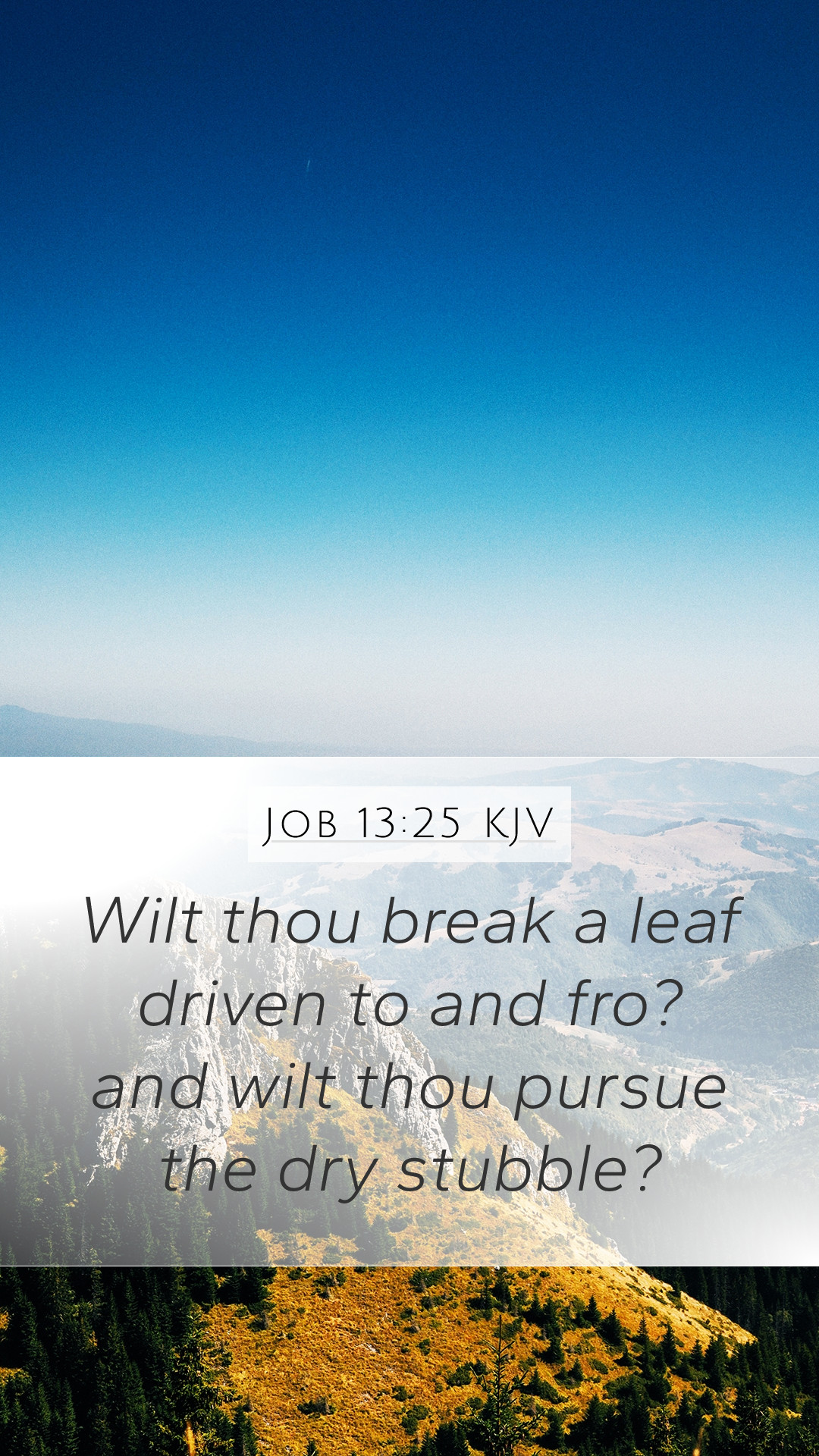Old Testament
Genesis Exodus Leviticus Numbers Deuteronomy Joshua Judges Ruth 1 Samuel 2 Samuel 1 Kings 2 Kings 1 Chronicles 2 Chronicles Ezra Nehemiah Esther Job Psalms Proverbs Ecclesiastes Song of Solomon Isaiah Jeremiah Lamentations Ezekiel Daniel Hosea Joel Amos Obadiah Jonah Micah Nahum Habakkuk Zephaniah Haggai Zechariah MalachiJob 13:25 Meaning
What is the meaning of Job 13:25?
Wilt thou break a leaf driven to and fro? and wilt thou pursue the dry stubble?
Job 13:25 Bible Verse Meaning
Understanding Job 13:25
Job 13:25 states: "Will you frighten a leaf driven to and fro? And will you pursue the dry stubble?" This verse captures Job's lamentation amidst his suffering and reflects deep theological implications about God's relationship with humanity, as well as the nature of fear, suffering, and divine justice. In this commentary, we explore the meanings and interpretations of this profound scripture.
Bible Verse Meanings
Job's Desperation: In this passage, Job is expressing his feelings of vulnerability. The imagery of a leaf being driven by the wind represents his frail state, emphasizing the pointlessness of pursuing someone when they are already in a position of weakness.
The Nature of Suffering: This verse reflects Job's broader questioning of God in the face of undeserved suffering. The "dry stubble" indicates something that is already damaged and insignificant, which questions the purpose of God’s relentless pursuit of him—suggesting that Job feels under attack, despite his innocence.
Bible Verse Interpretations
- Matthew Henry: Henry interprets Job's words as a challenge against the way God treats him, arguing that God should not treat him as a mere object or trifle. He emphasizes that Job's fear is irrational given his innocence.
- Albert Barnes: Barnes highlights that the reference to “a leaf” signifies fragility and futility. He suggests that Job is questioning why God would pursue him so aggressively when he is already suffering so much.
- Adam Clarke: Clarke notes the rhetorical nature of Job's question, pointing out that it serves to illustrate the absurdity of God’s treatment of the righteous. It evokes the sense that Job feels like he is being treated like something inconsequential.
Bible Verse Understanding
Job’s lament in this verse transcends time, reflecting a universal human experience of feeling persecuted during trials. It invites readers to consider the nature of divine justice and the experience of suffering in their own lives.
As believers engage in Bible study insights or bible study groups, they can find relevance in Job's questioning of God amid personal turmoil.
Bible Verse Explanations
This scripture also sheds light on the human condition; it illustrates the tendency to feel overwhelmed and abandoned during hardship. It challenges us to reflect on our own perceptions of God's justice and our individual suffering.
Historical Context of Job 13:25
The Book of Job is one of the oldest texts in the Bible and addresses profound questions about faith, suffering, and righteousness. The verse occurs during Job's dialogues with his friends who falsely accuse him of sin leading to his suffering.
Applying Bible Verses to Daily Life
Understanding this verse can have practical applications in daily life, especially in times of crisis. The recognition that one is not solely at the mercy of undeserved suffering can foster resilience and faith in God’s plan.
Cross References
- Psalm 1:4 - The wicked are not so; they are like chaff which the wind drives away.
- Isaiah 40:24 - They are scarcely planted, scarcely sown, scarcely has their stem taken root in the earth, when He blows on them, and they wither.
- James 4:14 - For you are a mist that appears for a little time and then vanishes.
Conclusion
In conclusion, Job 13:25 serves as a powerful reminder of the human experience of suffering and the inherent questioning of divine justice. Through Bible verse commentary and personal reflection, one can derive meaningful insights that resonate with the complexities of life’s challenges.


